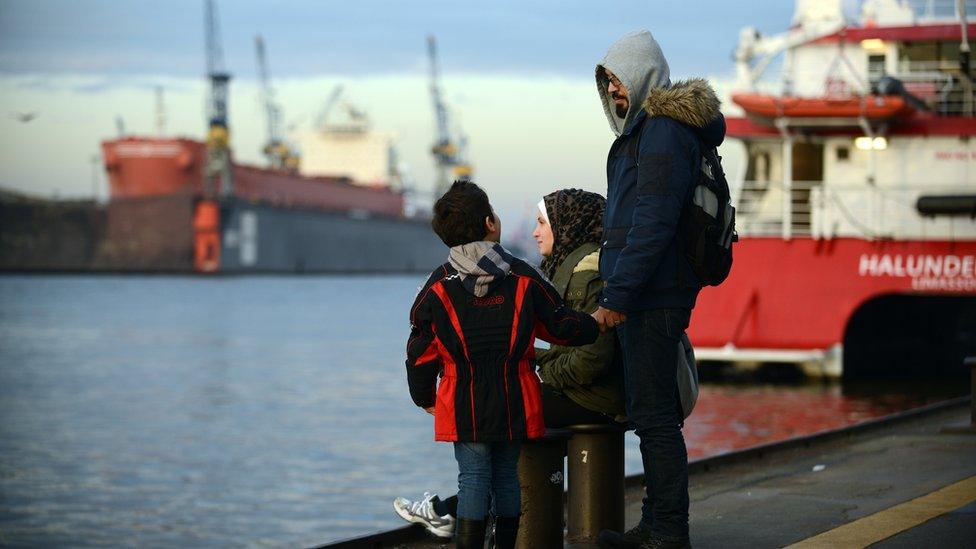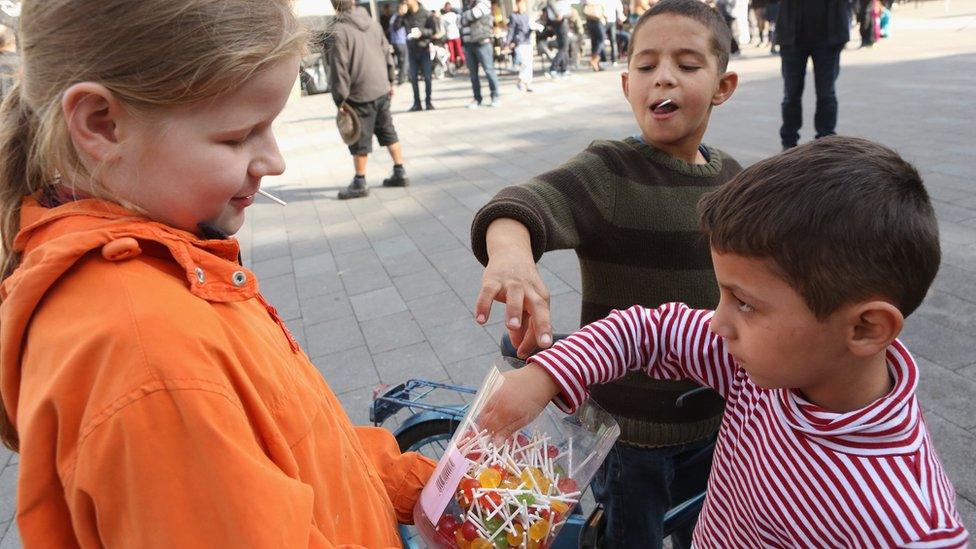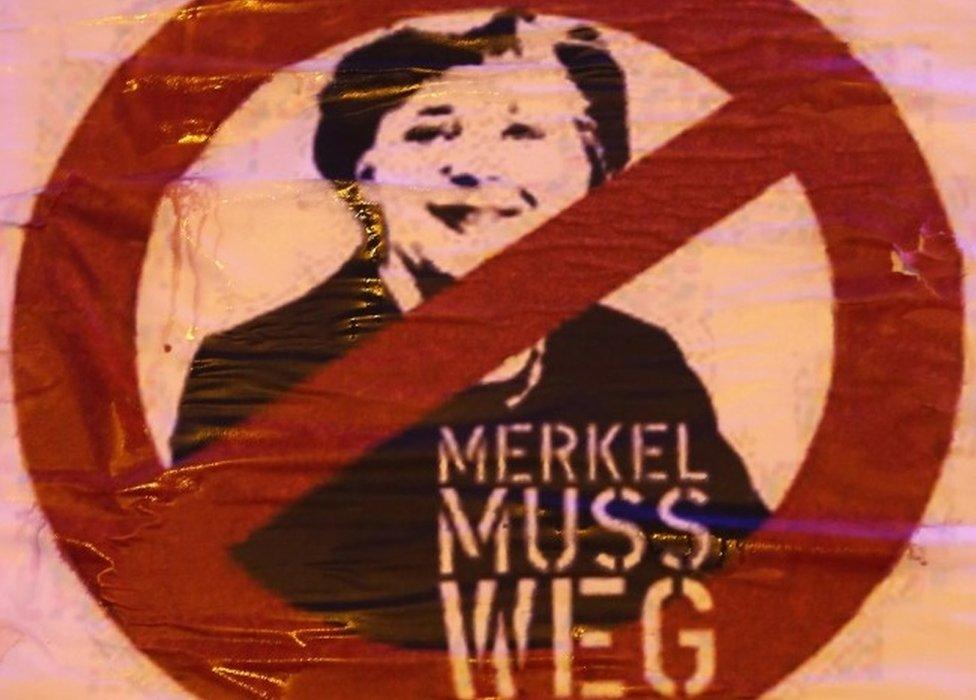Brand Merkel comes under pressure over migrants
- Published
- comments

Germany could see more than 1m refugees this year - and Hamburg is a popular destination
It didn't much look like a protest.
Lots of casually dressed, smiley very middle-class Germans - some with children, others with dogs, chatting animatedly in beautiful parkland on the outskirts of Hamburg on a sunny Sunday afternoon.
But this was indeed a protest group, putting together a petition in an attempt to stop a new refugee centre being built on the green.
People here were keen to emphasise that they were not anti-immigrant. Their main aim, they said, was to protect an area of natural beauty. But once we got talking, broader worries soon surfaced.
Birgit said finding a home was difficult enough for Germans. Hamburg has an acute housing shortage at the best of times. With the arrival of tens of thousands of immigrants, the port city threatened to burst at the seams.
In desperation, the authorities have been turning shipping containers into refugee homes and repossessing empty commercial properties and open spaces to build new migrant centres.
"I don't think Angela Merkel has any idea what she started," Birgit concluded.
Hanno kept shaking his head when he said, "I just don't think Germany can integrate this number of people. It's a real worry. A real worry."
This was no demonstration of the minority anti-immigrant far right in Germany, so adept at grabbing headlines.
These were Angela Merkel's core voters: the comfortable middle classes. Now plagued by doubt and insecurity.
To be clear: most Germans don't question a duty to help those fleeing war or human rights abuses but they do find the huge number of arrivals unsettling.
More than a million refugees are expected here by the end of the year. Some experts we spoke to told us the figure could reach 1.5m.
Like the captain of a football team, Chancellor Merkel keeps repeating: "Wir schaffen es!" ("We can do it!").
It's her version of Barack Obama's "Yes We Can" - but increasingly Germans are asking: How?

Groups of people have welcomed migrants to Hamburg - but many worry about how the country will cope
Only one in three here say they agree with Mrs Merkel's migrant policy, according to the most recent poll, external. And she's slipping in popularity ratings.
The joke used to be that she was a politician of 'little steps' who made decisions only once she'd studied the opinion polls.
But a summer of refugees drowning in the Mediterranean and desperate crowds thronging at the gates of Europe seems to have changed all that.
Mrs Merkel completely surprised her countrymen a month ago by unilaterally declaring all Syrian refugees welcome and refusing to put an upper limit on how many Germany would take in.
It seemed like a passionate outburst, a spontaneous throwing of caution to wind by a woman traditionally admired by Germans for her stable, strong and stoic disposition.
All sought-after attributes here.
'Hers is a solid brand'
Florian Juerg, a branding consultant, wonders whether Angela Merkel is now expressing her "other self".
"Until now she has acted like the sensible scientist that she is," he told me (Mrs Merkel is a trained physicist). "But suddenly she's transformed back into the moral-driven pastor's daughter of her youth."
Hamburg is the German hub for marketing and brand imaging.
I asked Florian if "Brand Merkel" would be dented by the migrant crisis.
"Not in the long-term," he told me.
"Building up a brand takes a long time and the last 10 years of Merkel as Chancellor have been good for Germans. Hers is a solid brand."
For now. But if her refugee policy backfires, it will stain her political legacy.
Mrs Merkel's nickname here is Mutti, or Mummy.
Election after election, Germans have put their trust in her to decide what's best for them. She's seen as key in making Germany the success story it is today.

'Merkel must go' reads one sign in the city of Magdeburg
The way she's handling the migrant crisis is the biggest gamble of her political career.
Brand Merkel may have helped make Brand Germany great but she could now inadvertently damage her country.
The arrival of so many asylum seekers in one go will impact Germany's economy, its society and its politics.
Already there are well-chronicled splits within Mrs Merkel's own conservative bloc.
"We have to get the balance right," said Lorenz Caffier, CDU Interior Minister of Mecklenburg-Western Pomerania.
"The German constitution demands that we look after refugees but the benefits we give them are too generous.
"Frankly, I'm amazed at any migrant who doesn't choose to come to Germany. Our benefit system acts like a travel agency. We must put the wellbeing of our own people first."
Cucumbers, bananas - or greater matters?
German newspapers are full of reports about the benefits refugees receive compared to German citizens on welfare, leading, in some quarters, to a sense of injustice.
There's also a more widespread worry about strains on the national health and education systems.
"Germany can't take everyone in," Mr Caffier told me. "Up till now we had no choice. Angela Merkel didn't open the door to the refugees. They were already at the door.
"What was she going to do - send tanks to the Austrian border? Actually it's impossible to close borders. Any politician who suggests that is lying."
He insisted vehemently that the rest of Europe play its part.
"We Germans can't do this alone. Brussels has to decide whether it's going to focus on the curvature of cucumbers and bananas or tackle European issues of importance."
In the meantime, other European leaders are not queuing up to take in asylum seekers by the hundreds and thousands.
Chancellor Merkel's lead role in the migrant crisis is as controversial in the rest of Europe as it is at home.
The queen of consensus politics is no more.